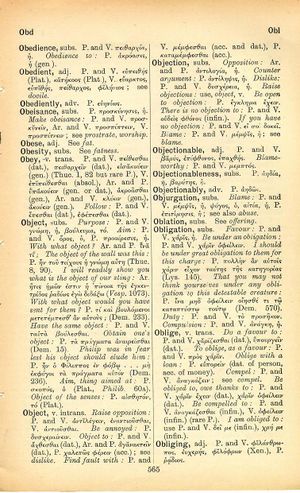object: Difference between revisions
Λάλει τὰ μέτρια, μὴ λάλει δ', ἃ μή σε δεῖ → Modestus sermo, et qualis deceat, sit tuus → Sprich maßvoll, spricht nicht aus, was unanständig ist
(Woodhouse 4) |
(CSV4) |
||
| Line 1: | Line 1: | ||
{{ | {{Woodhouse1 | ||
| | |Text=[[File:woodhouse_565.jpg|thumb|link={{filepath:woodhouse_565.jpg}}]]'''subs.''' | ||
<b class="b2">Purpose</b>: P. and V. [[γνώμη]], ἡ. [[βούλευμα]], τό. | |||
<b class="b2">Aim</b>: P. and V. [[ὅρος]], ὁ, P. [[προαίρεσις]], ἡ. | |||
<b class="b2">With what object?</b> Ar. and P. ἵνα τί; | |||
<b class="b2">The object of the wall was this</b>: P. ἦν τοῦ τείχους ἡ [[γνώμη]] αὕτη (Thuc. 8, 90). | |||
<b class="b2">I will readily show you what is the object of our sting</b>: Ar. ἥτις ἡμῶν ἐστιν ἡ ʼπίνοια τῆς ἐγκεντρίδος ῥᾳδίως ἐγὼ διδάξω (<b class="b2">Vesp.</b> 1073). | |||
<b class="b2">With what object would you have sent for them?</b> P. τί καὶ βουλόμενοι μετεπέμπεσθʼ ἂν αὐτούς; (Dem. 233). | |||
<b class="b2">Have the same object</b>: P. and V. ταὐτὰ βούλεσθαι. | |||
<b class="b2">Obtain one's object</b>: P. τὰ πράγματα ἀναιρεῖσθαι (Dem. 15). | |||
<b class="b2">Philip was in fear lest his object should elude him</b>: P. ἦν ὁ Φίλιππος ἐν φόβῳ . . . μὴ ἐκφύγοι τὰ πράγματα αὐτόν (Dem. 236). | |||
<b class="b2">Aim, thing aimed at</b>: P. [[σκοπός]], ὁ (Plat., <b class="b2">Philib.</b> 60A). | |||
<b class="b2">Object of the senses</b>: P. αἰσθητόν, τό (Plat.). | |||
'''v. intrans.''' | |||
<b class="b2">Raise opposition</b>: P. and V. ἀντιλέγειν, ἐναντιοῦσθαι, V. ἀντιοῦσθαι. | |||
<b class="b2">Be annoyed</b>: P. δυσχεραίνειν. | |||
<b class="b2">Object to</b>: P. and V. ἄχθεσθαι (dat.), Ar. and P. ἀγανακτεῖν (dat.), P. χαλεπῶς [[φέρω|φέρειν]] (acc.); see [[dislike]]. | |||
<b class="b2">Find fault with</b>: P. and V. μέμφεσθαι (acc. and dat.). P. καταμέμφεσθαι (acc.). | |||
}} | }} | ||
Revision as of 09:47, 21 July 2017
English > Greek (Woodhouse)
subs.
Purpose: P. and V. γνώμη, ἡ. βούλευμα, τό. Aim: P. and V. ὅρος, ὁ, P. προαίρεσις, ἡ. With what object? Ar. and P. ἵνα τί; The object of the wall was this: P. ἦν τοῦ τείχους ἡ γνώμη αὕτη (Thuc. 8, 90). I will readily show you what is the object of our sting: Ar. ἥτις ἡμῶν ἐστιν ἡ ʼπίνοια τῆς ἐγκεντρίδος ῥᾳδίως ἐγὼ διδάξω (Vesp. 1073). With what object would you have sent for them? P. τί καὶ βουλόμενοι μετεπέμπεσθʼ ἂν αὐτούς; (Dem. 233). Have the same object: P. and V. ταὐτὰ βούλεσθαι. Obtain one's object: P. τὰ πράγματα ἀναιρεῖσθαι (Dem. 15). Philip was in fear lest his object should elude him: P. ἦν ὁ Φίλιππος ἐν φόβῳ . . . μὴ ἐκφύγοι τὰ πράγματα αὐτόν (Dem. 236). Aim, thing aimed at: P. σκοπός, ὁ (Plat., Philib. 60A). Object of the senses: P. αἰσθητόν, τό (Plat.). v. intrans. Raise opposition: P. and V. ἀντιλέγειν, ἐναντιοῦσθαι, V. ἀντιοῦσθαι. Be annoyed: P. δυσχεραίνειν. Object to: P. and V. ἄχθεσθαι (dat.), Ar. and P. ἀγανακτεῖν (dat.), P. χαλεπῶς φέρειν (acc.); see dislike. Find fault with: P. and V. μέμφεσθαι (acc. and dat.). P. καταμέμφεσθαι (acc.).

